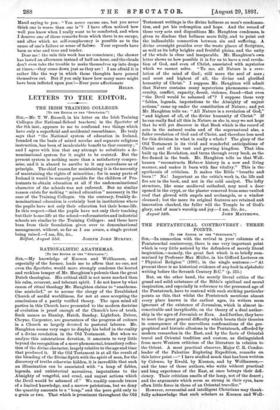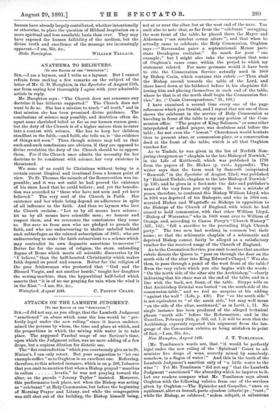THE PENTATEUCHAL CONTROVERSY: THREE POINTS.
[To THE EDITOR OF THE " ErECTATOR.".1 Siu,ŌĆöIn connection with the revival in your columns of a. Pentateuchal controversy, there is one very important point which is very little noticed by the defenders of merely literal inspiration,ŌĆönamely, the great fact which is so briefly sum- marised by Professor Max Muller, in his Gifford Lectures on " Physical Religion" (1891), in the single sentence :ŌĆö" At present there is no historical evidence of any book in alphabetic- writing before the Seventh Century B.C." (p. 215.)
But, on the other hand, the merely literal critics of theŌĆó grand and solid substance of the Bible's spiritual and moral inspiration, and especially in reference to the presumed age of the Pentateuch, have to contend with such striking particular- points as this, that whilst the Pentateuch mentions almost every place known in the earliest ages, its writers seem ignorant of the existence of Jerusalem, which is almost in- conceivable and inexplicable, on the theory of a dual author- ship in the ages of Jeremiah or Ezra. And further, they have. to meet the great general difficulty which besets their theories in consequence of the marvellous confirmations of the geo- graphical and historic allusions in the Pentateuch, afforded hy modern researches in the East, and by the facts of Oriental travel and Oriental tradition and custom, as distinguished from mere Western criticism of the literature in relation to. the Orient. A most practical observer, Major C. R. Conder, leader of the Palestine Exploring Expedition, remarks on' this latter point :ŌĆö" I have studied much that has been written. by Colenso, by Ewald, by Kuenen, and by Wellhausen,ŌĆö and the tone of those authors, who write without practical and long experience of the East, at once betrays their defi- ciency. Their criticism smells of the lamp, not of the desert and the arguments which seem so strong in their eyes, have- often little force in those of an Oriental traveller."
However, reverential and intelligent Christians may thank- fully acknowledge that such scholars as Kuenen and Well-. hausen have already largely contributed, whether intentionally or otherwise, to place the question of Biblical inspiration on a more spiritual and less assailable basis than ever. They may have exposed the human fallibility of the medium, but the divine truth and excellence of the message are increasingly apparent.ŌĆöI am, Sir, &c.,



































 Previous page
Previous page